The 5 Best Affordable Hearing Aids of 2025 (Audiologist-Reviewed)
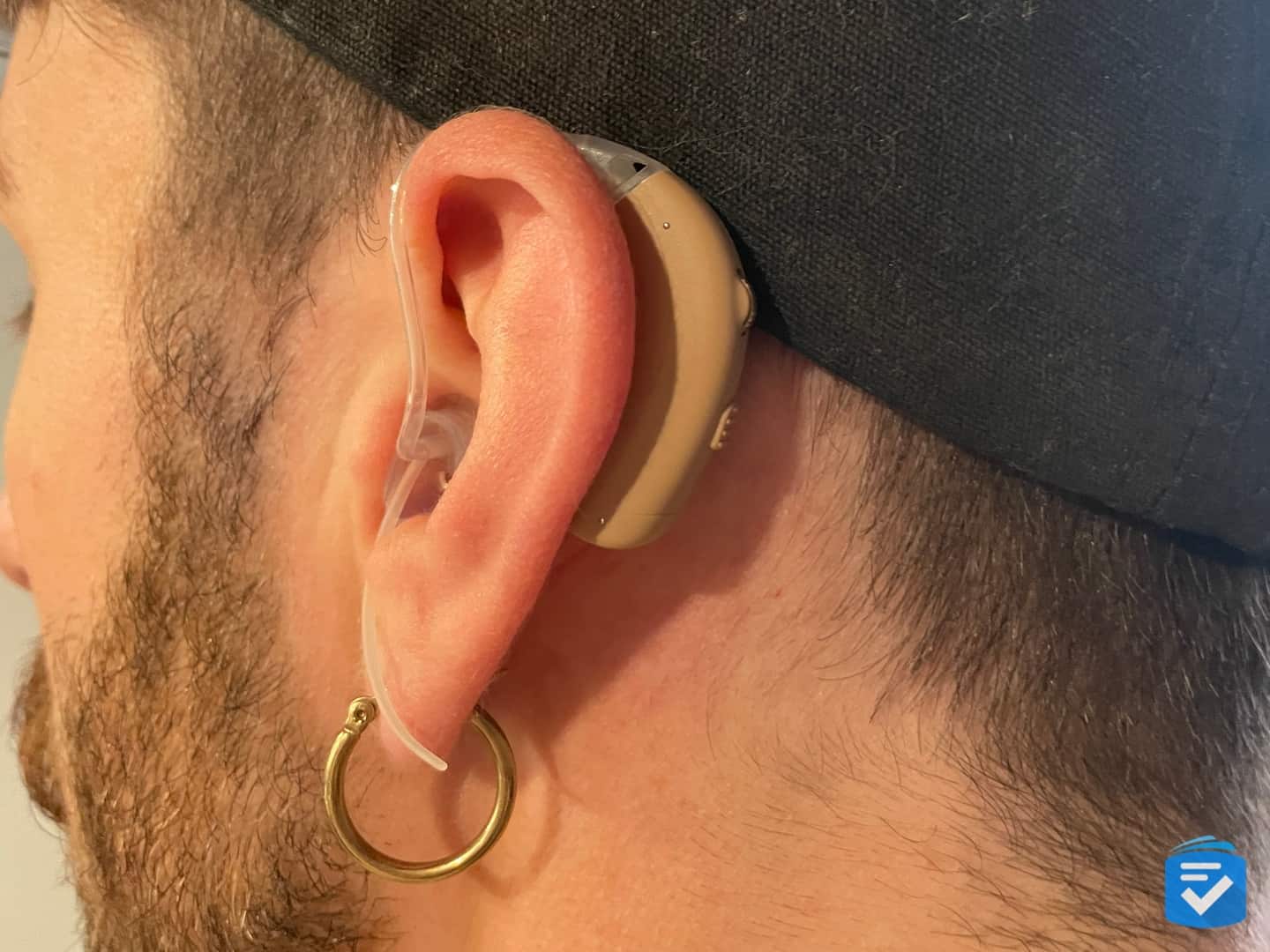
Looking for affordable hearing aids without sacrificing quality? Our comprehensive testing of 30 devices from 12 brands reveals that you don’t need to spend a fortune to improve your hearing. From MDHearing’s budget-friendly $297 pair to Jabra Enhance’s feature-packed options starting at $1,195, we’ve identified the five best affordable hearing aids of 2025.
Each device balances cost with essential features such as sound quality, battery life and customer support. Whether you need smartphone connectivity, invisible design or moisture resistance, our expert-tested recommendations will help you find the perfect hearing solution affordably.
Why Trust Us?
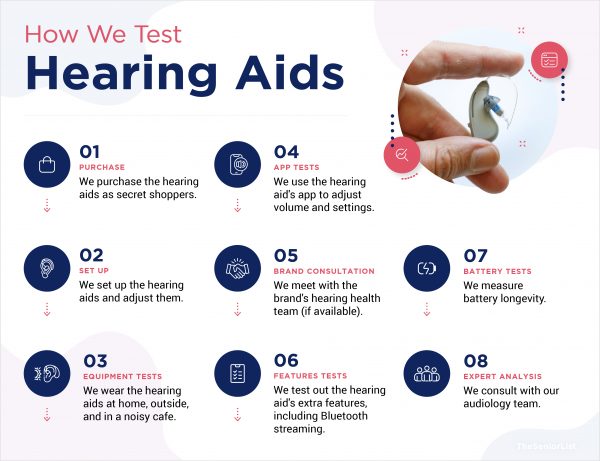
To create this list, we tested 30 hearing aids from 12 brands. We evaluated each device on a variety of criteria.
- Impressive audio: Sophisticated devices have premium features such as custom soundscapes and smartphone compatibility, but a hearing aid should deliver quality sound first and foremost.
- Affordability: You can find a pair of hearing aids for $100, but they tend to work poorly. Every hearing aid on this list costs less than $2,000 for a pair, and they performed well in our tests.
- Audiologist support: Prescription hearing aids require consultations with a hearing specialist, but over-the-counter (OTC) hearing aids offload that responsibility to the user. We gave extra points to devices that came with professional support.
- Trial periods: Each of these manufacturers offers trial periods on their hearing aids, allowing you to be sure it works before you spend thousands of dollars.
- Long-lasting batteries: Whether they’re powered by rechargeable or disposable batteries, a good hearing aid needs to work throughout the entire day. All the devices on this list can hold enough juice for daily use.
If budget is of less concern, check out our rundown of the best hearing aids overall.
Our Top-Rated Affordable Brands
- Jabra Enhance Select 700 : Best Smartphone Connectivity
- MDHearing Air : Most Affordable Hearing Aids
- Eargo SE : Best Invisible Hearing Aid
- Lexie B2 Plus : Best Personalization Features
- Otofonix Helix : Best Rechargeable Hearing Aids
Our Video Rundown
The Most Affordable Hearing Aids of 2025
Jabra Enhance Select 700 - Best Smartphone Connectivity
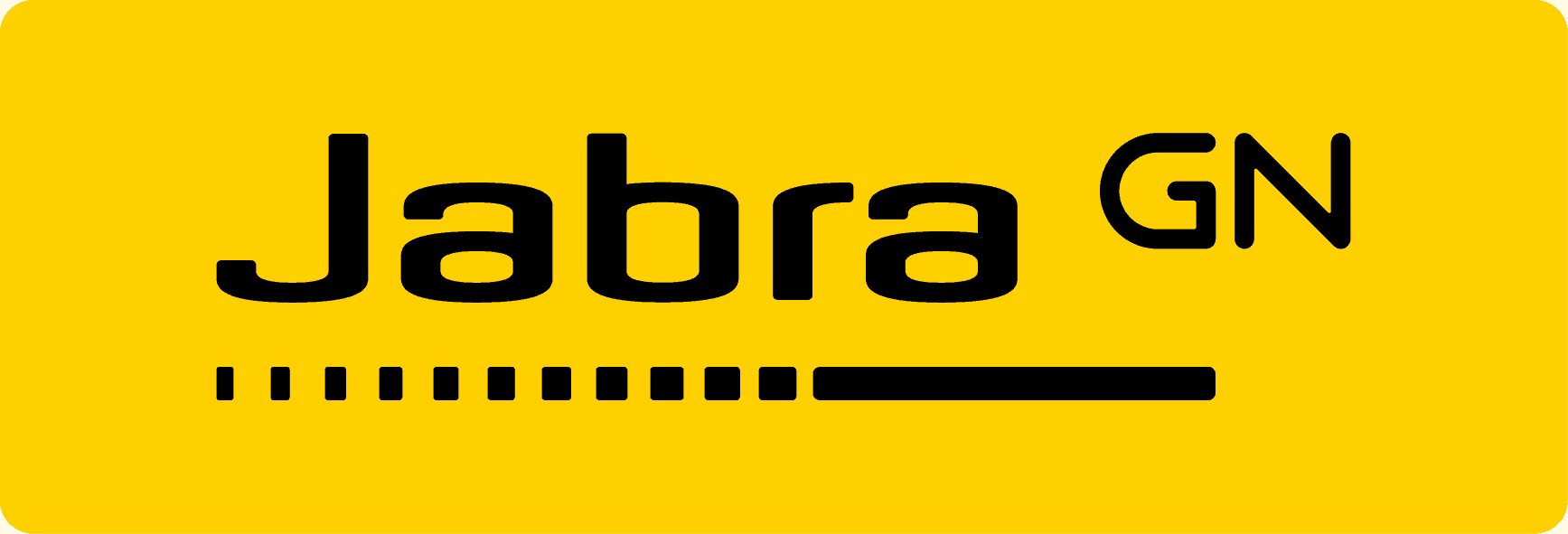
What We Like Most:
- Small size
- IP68 water-resistance
- Bluetooth compatibility on Android and Apple devices
- 24-hour battery life

Overview
Cost: $1,995 for a pair
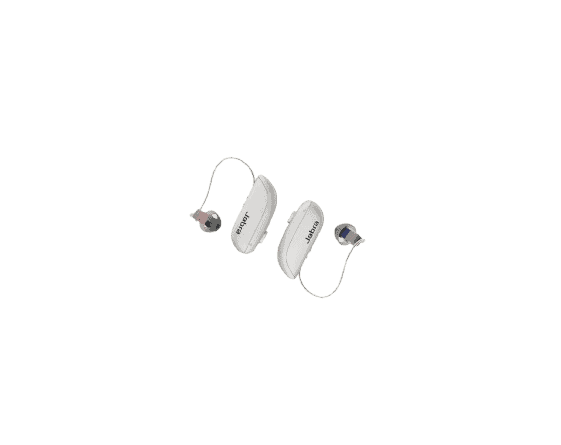
Credit: Jabra Enhance
Jabra Enhance hearing aids command a higher price than MDHearing devices, but they deliver where it counts: advanced sound performance paired with seamless smartphone connectivity. Instead of fumbling around in your ear to make adjustments, you simply tap your phone—a feature that proved invaluable during testing.
>>Read more: Jabra Enhance Hearing Aid Costs
The Select 700 model offers more than just standard Bluetooth; it includes Auracast technology, which simultaneously streams audio from a single source to multiple devices. This feature significantly enhanced our listening experience, whether we were sharing music from an Android phone or streaming movie dialogue directly to our ears at the theater. Fine-tuning was effortless with the Jabra Sound+ app, which provides three preset modes (Commute, In Public, In Private) and full customization options.
These hearing aids performed exceptionally well in all testing scenarios, from intimate conversations to noisy restaurants, by intelligently suppressing background noise and amplifying speech. They even maintained crystal-clear audio in breezy outdoor conditions, a scenario where lesser devices typically produce annoying wind-generated hissing.
Battery life is also great on these hearing aids. These lasted a full day on a single charge, and the rechargeable case gives you three extra charges. Plus, with three years of audiologist support and a comprehensive warranty that even covers damage and loss, the Jabra Enhance Select 700 hearing aids are truly a great deal.
To learn more about these hearing aids, read our full Jabra Enhance hearing aids review.
Pros
- Excellent warranty period
- Easy and comfortable to wear
- High-quality sound
- Ongoing support from hearing professionals
- Easy-to-adjust settings in app
- Auracast-compatible
Cons
- No in-person fittings
- No invisible options
MDHearing Air - Most Affordable Hearing Aids

844-554-2820
What We Like Most:
- Under $300 for a pair
- Easy to use and order maintenance supplies
- 45-day trial period
- Lifetime customer support
Overview
Cost: $297 for a pair
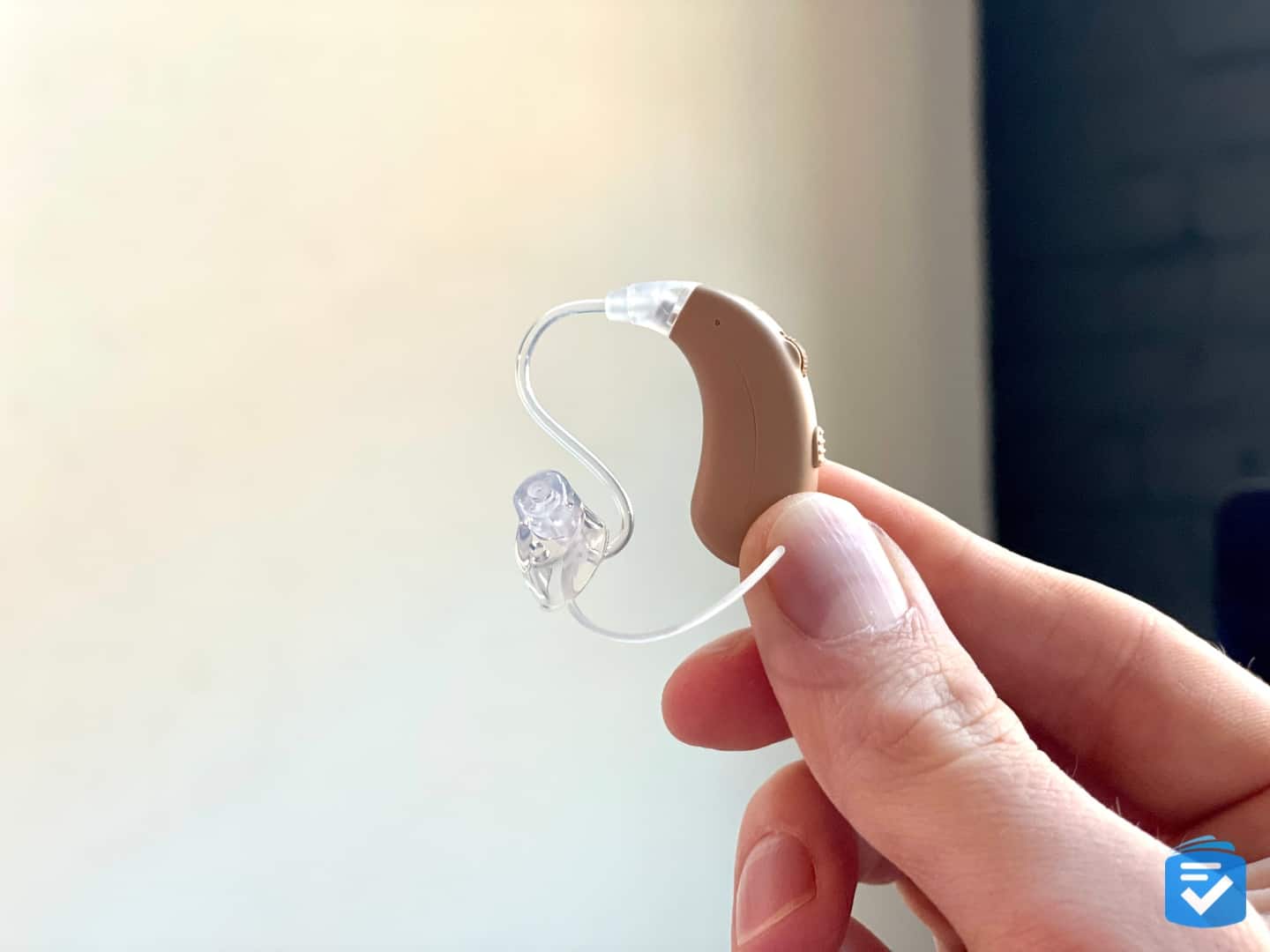
MDHearing has built its reputation on delivering surprisingly effective hearing aids at budget-friendly prices. While most models skip modern conveniences like Bluetooth and smartphone integration (only the Volt Max offers these features), they focus on what matters most: reliable sound enhancement that actually works.
At just $297 per pair, the Air represents MDHearing’s entry-level option that doesn’t feel entry-level. Four preprogrammed settings handle the most common listening scenarios—quiet, noisy, social, and restaurant environments—with simple one-button switching between modes. The restaurant setting proved particularly impressive, cutting through cafe chatter to deliver clear conversation across the table.
The 2025 model upgrades from disposable to rechargeable batteries, delivering roughly 16 hours of use per charge. The included portable charging case extends that with several additional charges on the go.
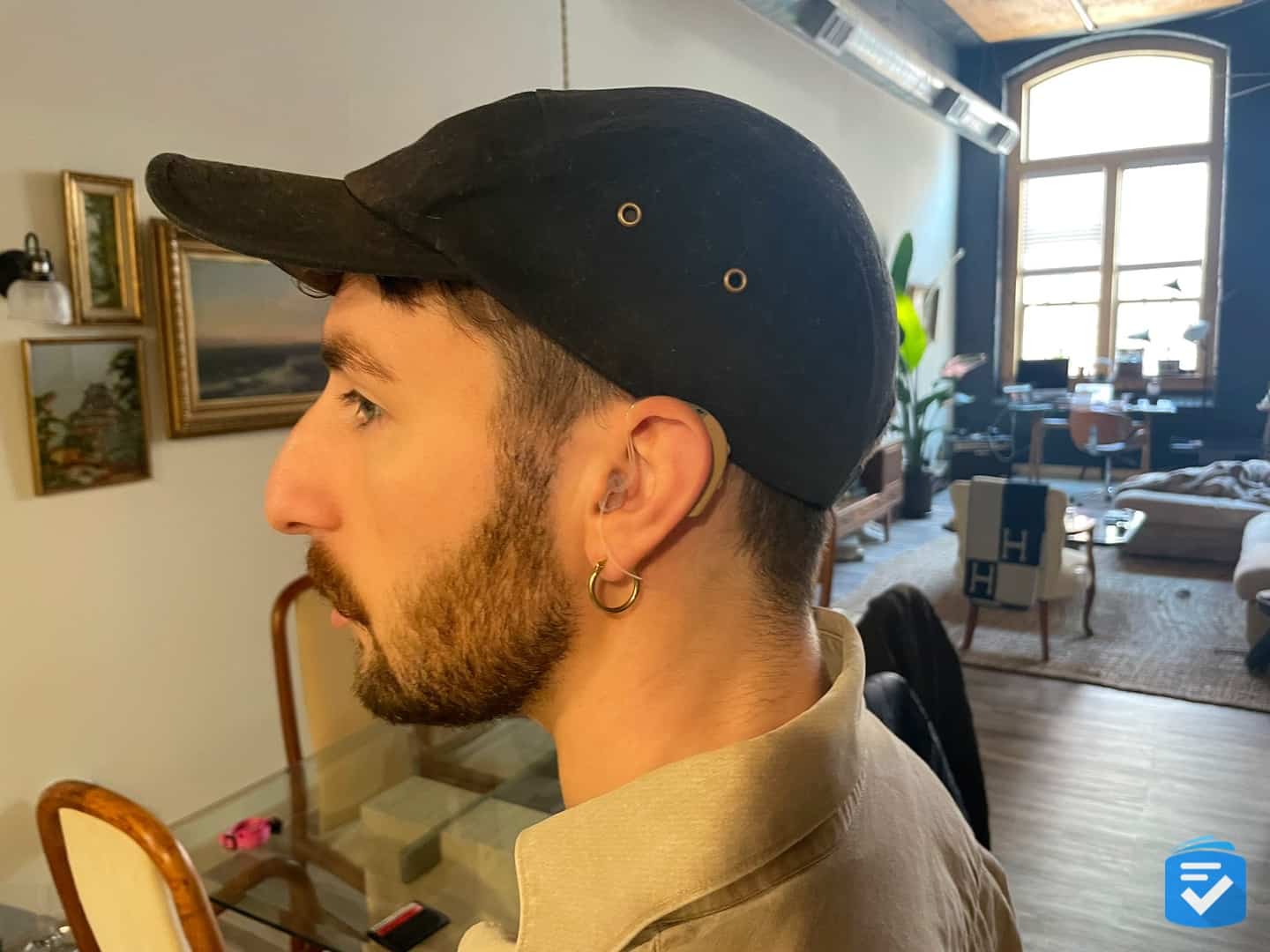
MDHearing’s customer service stands out in the industry. Every support call connected promptly with knowledgeable representatives who patiently explained proper usage techniques. Their dedicated insurance specialists even guided us through the claims process.
While the Air lacks the advanced personalization found in Eargo and Jabra models, its unmatched affordability and 45-day trial period make it an easy recommendation for anyone seeking proven hearing enhancement without premium pricing.
To learn more about the company and its devices, check out our MDHearing review and our guide to MDHearing costs.
Pros
- 45-day risk-free trial
- Affordable medical-grade devices
- FDA registered
- Easy online ordering
- Can be purchased in pairs or single
Cons
- No in-person evaluations
- No personalized programming

Eargo SE - Best Invisible Hearing Aid

866-334-3974
What We Like Most:
- Invisible when worn
- Rechargeable batteries
- Skilled remote support
- Advanced noise reduction
Overview
Cost: $1,699 for a pair
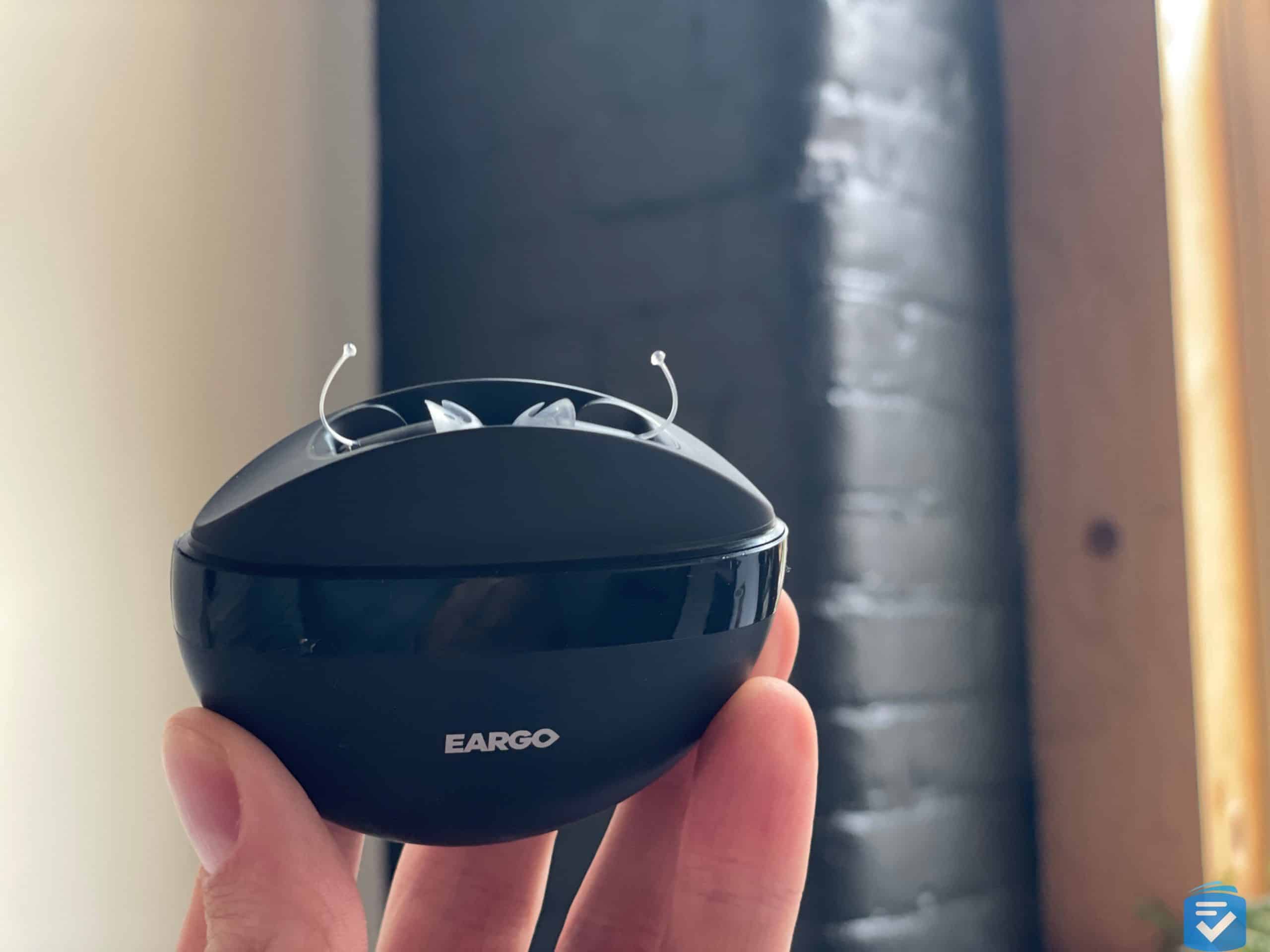
Eargo has earned its “Apple of hearing aids” nickname through sleek design and cutting-edge technology. The SE model, their most budget-friendly option, exemplifies this approach—delivering powerful sound performance in a practically invisible package that defies its compact size.
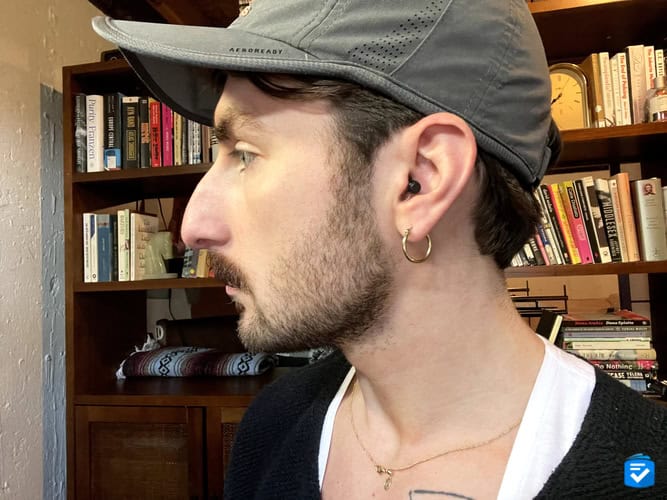
Eargo’s standout feature is Sound Match, an innovative app-based hearing assessment that feels like having a personal audiologist in your pocket. The process resembles a private screening: you listen to various tones through each ear and respond via iPhone. Within minutes, your Eargo SE automatically calibrates to your specific hearing environment—no guesswork required.
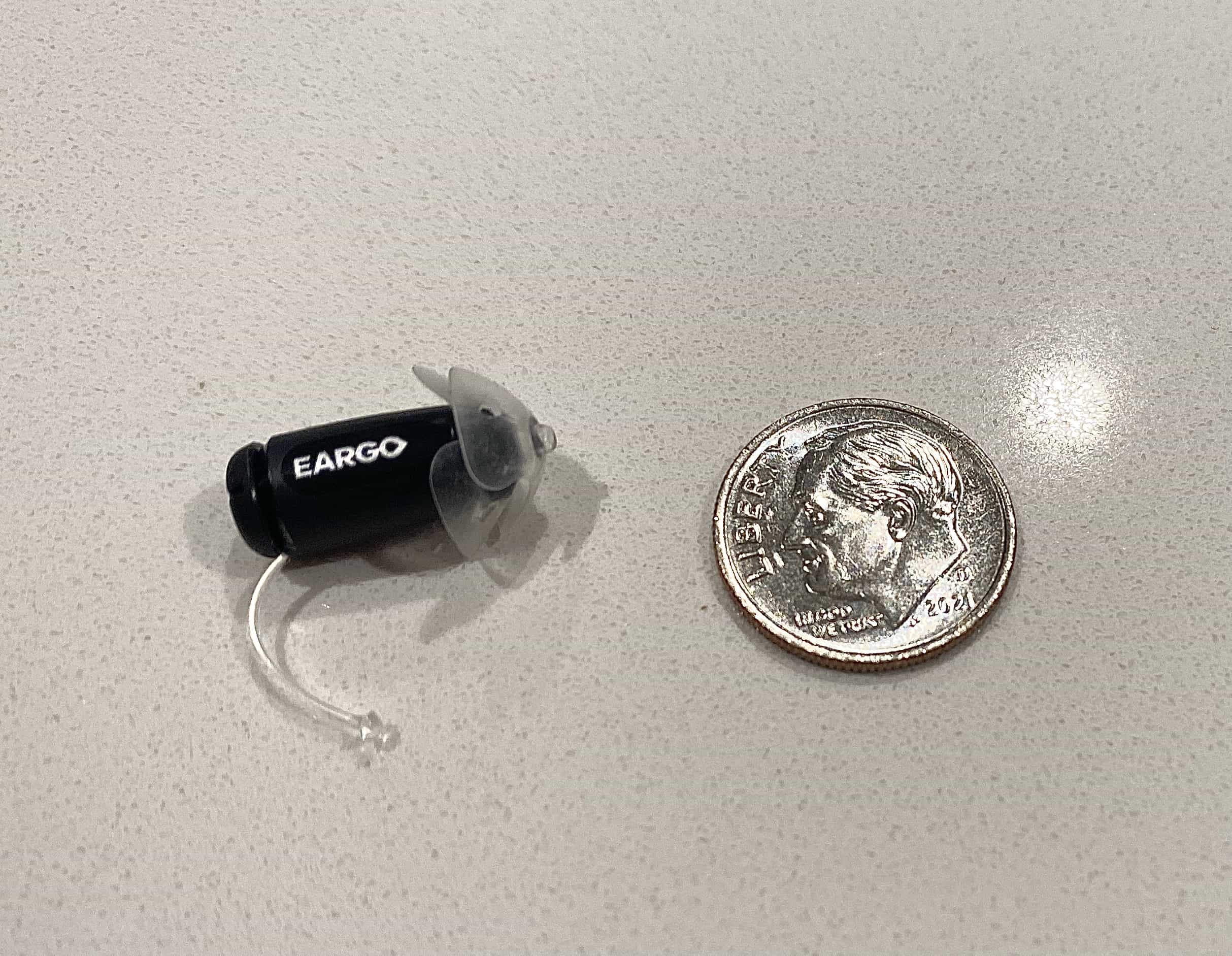
The SE excels across diverse scenarios, from TV watching to café conversations to outdoor walks. The hearing aids consistently suppress background noise while amplifying whoever you’re facing, creating natural, focused listening experiences.
Eargo backs their technology with lifetime support from their hearing health team at no additional cost. Whether you prefer traditional phone calls or video consultations through the Eargo app, expert help is always available, a premium service that adds significant value to an already impressive product.
To learn more about our experience with Eargo hearing aids, read our full Eargo hearing aids review and our rundown of Eargo hearing aids costs.
Pros
- Lightweight and comfortable
- Stellar sound quality
- Attentive customer service
- Secure in-ear fit
Cons
- No in-person fittings
- No direct Bluetooth streaming or streaming accessories
Lexie B2 Plus - Best Personalization Features
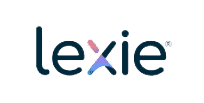
(779) 213-5476
What We Like Most:
- Under $1,000 for a pair
- Self-tuning via the Lexie app
- Nearly invisible, receiver-in-canal design
- Powered by Bose
Overview
Cost: $999 for a pair
The Lexie B2 Plus combines Bose’s renowned audio technology with practical, all-day wearability. These over-the-counter hearing aids deliver up to 18 hours of continuous use before returning to their rechargeable case, a significant upgrade from older battery-dependent models that simplifies daily maintenance.
While Lexie provides solid hearing specialist support, their smartphone app steals the show. The intuitive interface lets you fine-tune volume, frequencies, and directionality on the fly. In crowded restaurants, you can focus the hearing aids on your dinner companion while filtering out surrounding chatter. When time is short, four preset listening environments handle common scenarios instantly.
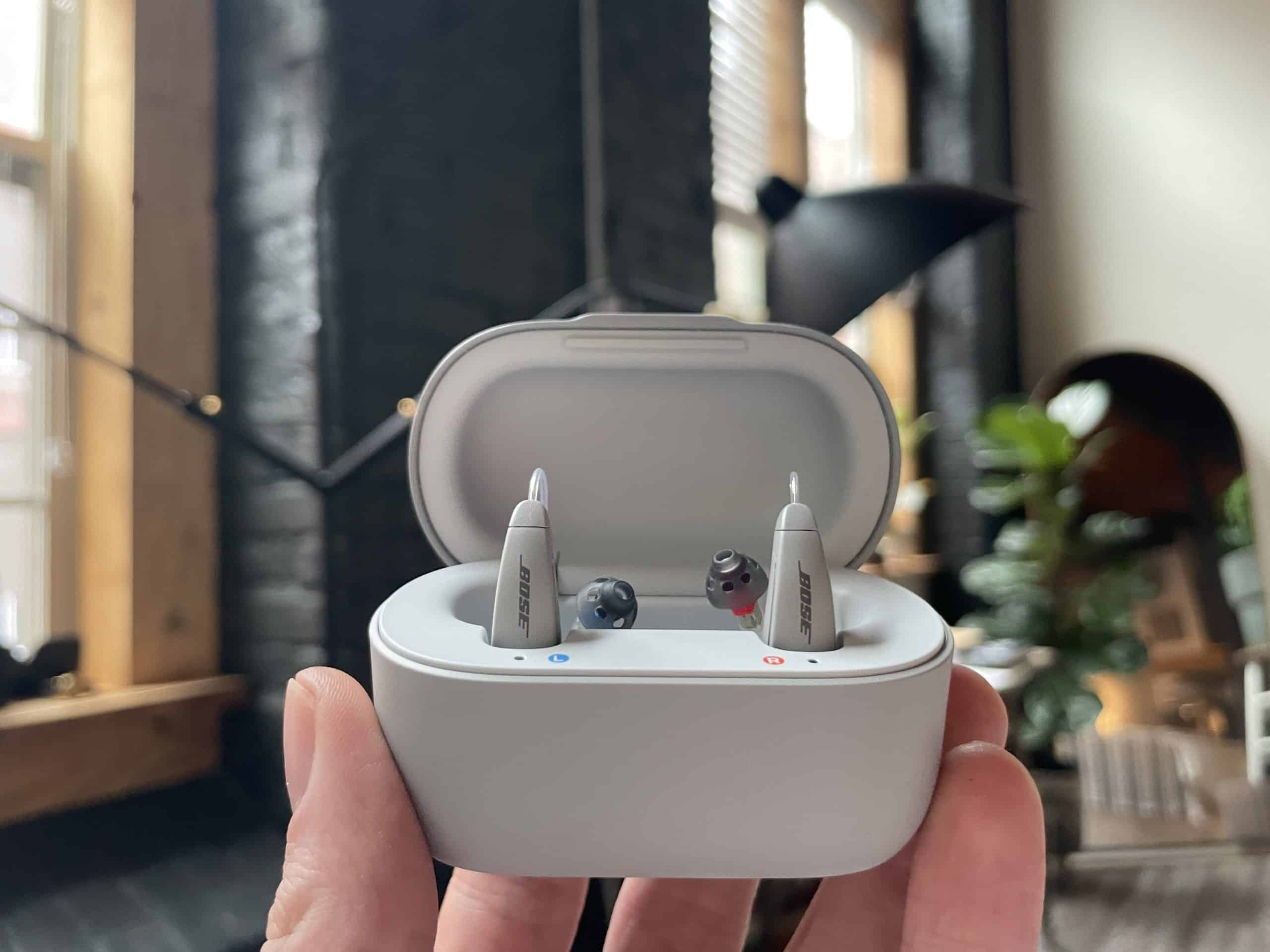
Lexie includes a free in-app hearing assessment alongside their 45-day money-back guarantee, letting you test-drive the technology risk-free. The standard package includes a one-year warranty and lifetime service support. For users wanting premium treatment, the optional Lexie Club ($9.99/month) extends warranty coverage to two years and adds priority support and additional benefits.
This combination of Bose audio engineering, user-friendly controls, and flexible support options makes the B2 Plus a compelling choice for those seeking professional-grade hearing aids without the hassle of hearing health clinics.
To learn more about the hearing aids, read our full Lexie hearing aids review.
Pros
- Skilled hearing specialist support
- Self-fitting
- Advanced noise reduction
- One-year warranty
- Under $1,000
Cons
- No phone or music streaming
Otofonix Helix - Best Rechargeable Hearing Aids

What We Like Most:
- Rechargeable batteries
- Noise cancellation
- Battery life of up to 18 hours
- Four listening programs
Overview
Cost: $297 for a pair
The Otofonix Helix eliminates the hassle of traditional hearing aid maintenance. Unlike older models requiring battery removal and replacement, these rechargeable devices simply slip into their charging case for two hours, then deliver up to 18 hours of continuous use. This seamless approach means all-day wear without power anxiety; just remove them at bedtime and they’re ready for tomorrow.

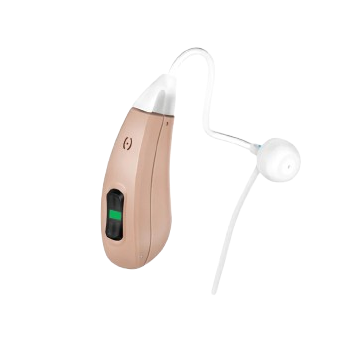
Credit: Otofonix Hearing Solutions
Beyond convenient charging, the Helix excels at noise reduction while offering impressive personalization options. Four distinct listening programs and ten volume levels let you fine-tune your experience for any environment. While the price exceeds MDHearing’s budget-friendly options, our testers consistently preferred Otofonix’s superior sound quality.
Pros
- Rechargeable design
- Good battery life
- Noise customization
- 45-day trial period
Cons
- Limited features
- Not Bluetooth compatible
New to the world of hearing aids? I recommend taking a look at my guide to hearing aids, covering their cost, function and the types available.
Does Medicare Cover Hearing Aids?
Many older adults are surprised to learn that Medicare Parts A and B, i.e. Original Medicare, do not cover hearing aids or fittings. Medicare Part B covers diagnostic hearing exams only if ordered by your doctor to diagnose a medical condition, but not routine hearing tests or hearing aids themselves.
Medicare Coverage Breakdown
- Original Medicare (Parts A and B): Does not cover hearing aids, fittings or routine hearing exams.
- Medicare Advantage (Part C): Many plans offer some hearing benefits, although coverage varies significantly among providers.
- Medicare Supplement (Medigap): These policies typically don’t include hearing aid coverage.
Medicare Advantage Hearing Benefits
If you’re enrolled in a Medicare Advantage plan, you may have access to hearing benefits not available through Original Medicare. The plans often include:
- Annual hearing exams
- Discounts on hearing aids (typically $500 to $1,500 per device)
- Access to specific provider networks for hearing services
Before purchasing hearing aids, check with your Medicare Advantage provider about coverage limits, in-network providers, and any required referrals or authorizations.
Alternative Funding Options
If Medicare doesn’t provide sufficient coverage for your hearing needs, consider these alternatives:
- Medicaid: Coverage varies by state, but it may include hearing aids for eligible recipients.
- Veterans benefits: The Department of Veterans Affairs provides hearing aids to qualifying veterans.
- Nonprofit organizations: Organizations such as the Hearing Aid Project and Help America Hear assist low-income individuals.
- Health savings accounts (HSAs) and flexible spending accounts (FSAs): These accounts allow you to pay for hearing aids with pretax money.
Are There Hearing Aid Discounts for Seniors?
The cost of hearing aids is generally high, but there are a few ways to get a discount on them.
- AARP Hearing Solutions: AARP members can save up to 50 percent on prescription hearing aids and up to $200 on OTC hearing aids, and get a free hearing exam and consultation through AARP’s partnership with UnitedHealthcare. Insurance isn’t required. Just mention your AARP membership number to UnitedHealthcare Hearing to receive the benefits.1
- VA health benefits: To qualify for hearing aid benefits, you first have to qualify for VA health benefits. To apply, fill out an application for health benefits. Once approved, you may be eligible for either free or low-cost hearing aids. Coverage varies from person to person, but people with disabilities, prisoners of war, Purple Heart recipients and recipients of benefits under 38 U.S.C. 1151 are most likely to receive coverage.
- Medicare Advantage: Medicare covers neither hearing aids nor overall hearing health, but many Medicare Advantage plans offer discounts or coverage for hearing aids and exams.
- Charitable organizations: Organizations such as the Hearing Aid Project2 and the Miracle Ear Foundation3 offer free or affordable hearing aids to people whose income meets certain requirements. You may qualify for the Hearing Aid Project if you have a low income, no health insurance or documented hearing loss.
- Buy OTC hearing aids: Over-the-counter hearing aids have been in the works for nearly a decade, but President Joe Biden’s 2022 executive order finally allowed affordable, medical-grade hearing aids to be sold in stores, lowering costs significantly.4
Hearing Aids vs. Hearing Devices
Some companies sell personal sound amplifiers versus hearing aids. The devices are often cheaper than hearing aids because they work as amplifiers rather than true hearing aids. In some cases, it’s a way to get hearing support in a more budget-friendly fashion. In this article, however, we looked exclusively at fully functional, FDA-approved hearing aids.
Recap
Hearing aids can be quite costly, but there are plenty of great budget-friendly options available. Whether you opt for a simple device or a brand that offers interest-free financing, there are ways to decrease the cost of better hearing.
No one should have to live through hearing loss because of the prohibitive cost of hearing aids. By choosing one of the affordable devices on this list, you can rest assured you won’t have to break the bank to restore the hearing and quality of life you deserve.
Frequently Asked Questions
-
How can I get a hearing aid for free?
There are many ways to get free or discounted hearing aids, depending on the state you live in. We recommend looking into nonprofits or charitable organizations that offer free or refurbished hearing aids. Unfortunately, neither Medicare nor most health plans will cover hearing aids.
-
Do inexpensive hearing aids really work?
Inexpensive hearing aids work, but some models may have lower sound quality, emit loud noises or be unable to mute background noise.
-
What are the best hearing aids under $100?
In our experience, anything under $100 is just a glorified earbud and will not actually help with hearing loss.
-
How long does a hearing aid last?
In general, hearing aids can last three to seven years, depending on usage and care. It’s important to maintain and thoroughly clean your hearing aids.
-
What is the alternative to hearing aids?
Personal sound amplification products, or PSAPs, are affordable alternatives to hearing aids. Their price usually ranges from $20 to upward of $600. “PSAPs are intended to amplify environmental sound for non-hearing-impaired customers,” according to the FDA, and they are not for everyday use.

